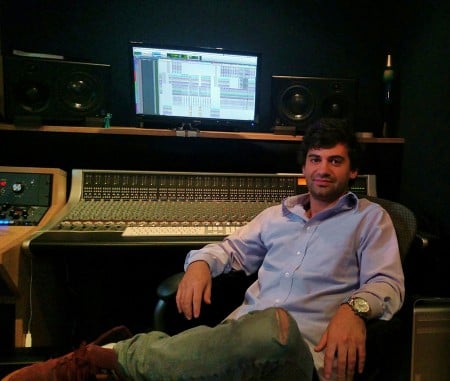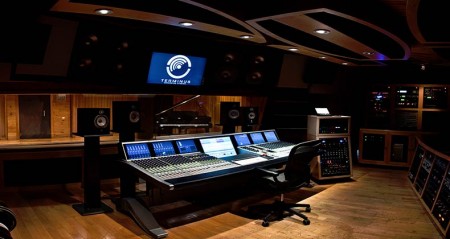As a Recording Connection student a number of years ago, Jesse Rothman was a perfect example of what can happen when you take personal responsibility for your career. He did his research, came prepared, and even knew the studio he wanted to be trained in. As a result, he was placed as an apprentice with noted Recording Connection mentor Sax DMA at Terminus Studios (formerly called Tainted Blue) in Times Square, New York City. While there, he took every opportunity to make himself useful, and after graduation became a regular at the studio.
Since coming to Terminus, not only has Jesse gotten to work with such artists as Pitbull, Liza Minelli and The Fray but as a lifelong musician himself, he’s also working on recording and releasing original material with his band. Even more than that—the star student has now become the teacher, and Jesse is now mentoring the next generation of Recording Connection students! In the interview below, Jesse talks with us about what first drew him to the program, his experiences working with Sax DMA, and his best advice for students now that he’s a mentor himself.
RRFC: Can you take us back to when you were first thinking about making audio engineering a full-time thing? How did you go about trying to find the right program for you?

Recording Connection mentor Jesse Rothman in Terminus’ B room.
Well, I heard about the Recording Connection, I don’t exactly remember where I heard about it; it might have been word of mouth, it might have been through research or a little bit of both…We were looking at audio schools, and we saw the Recording Connection, which was a fraction of the price, so financially it made a lot of sense. And from that point, I had learned that there’s any number of places they can place you. So I did my research…I found this place. I knew I wanted to go here. So that was how I went about it. I applied for this specific location through the Recording Connection…I came, met Sax. He interviewed me and pretty much admitted me on the spot. He could tell that I was interested, and I had the right vibe for the studio.
RRFC: That was at Terminus?
Jesse: Yes. It was formally [called] Tainted Blue back then.
RRFC: What did you notice about Sax right off the bat?
Jesse: Very energetic…He’s very much a music guy, very loud and energetic obviously. Everybody that knows a little bit about him knows that much. But good heart, good guy and he was actually a really good guy to start with because he applied a lot of real—what would I call it?–I guess, real world kind of pressure, the stuff that you can’t get in the classroom. He would hit you with that pressure…You get a lot of experience really quickly that way because a lot of students come out of college, music college, they’ve never actually been in a real session. They’ve been in a lot of simulated sessions in the classroom and this and that. But it’s different when someone is paying for it and you got to make them happy. He put a lot of real-world pressure on you that you can’t really get from a classroom.
RRFC: How was it beneficial for you to be in a pro studio from the get-go instead of a classroom where you’re learning about the stuff in a book?
Jesse: You have to be able to carry yourself a certain way [in the studio]. I grew up around recording studios, musicians and tours, so I was already familiar…it wasn’t really weird to me. It would have been weirder being in the classroom, quite honestly. But like I said, a lot of that real world experience that you can’t get from a classroom, you have to get from a working environment.

Terminus Studios – Studio A
Well, first and foremost, I’d have to say the people. The owner and manager of this studio are really, really cool. They allow us to operate it in the way that we do… The engineers, as well, are very knowledgeable the vibe here. So you come off of the street in Times Square, and you’re in this very beautiful studio with wood floors, and it’s private and there’s really nice people. It’s hard to beat that. And then on top of that, the gear up here is just insane. We have a stacked mic locker, and we just recently refurbished the B room with an array of outboard gear and an SSL AWS 924. You can come up here and record, mix or enjoy the penthouse view. It’s just a stand up facility.
RRFC: As a former student, and now as a mentor, why do you enjoy passing the torch to the younger generation as far as your knowledge that you’ve gained?
Jesse: Well, there’s certain kinds of people, right? There’s people who want to do this music thing because they think that’s what they want to do, and they want to get famous or rich or whatever. And then there’s people who just are genuinely…they’re going to be doing it anyway, so they might as well pursue it. And it’s really easy to tell the people who are going to be proactive and really apply themselves to this, and the people who just pay and expect things to just happen for them.
RRFC: Making contacts in the studio is one thing, but what about maintaining contacts? Any advice for students about that?
Jesse: The best thing that I can say is if you’re a musician or you’re a mix engineer is always have your stuff on you, handy ready to give to the right person on a flash drive, something like that. Carry flash drives and business cards around. Be ready with something just in case you do come across those people. If you can show them some music, something that’ll genuinely get them interested, that’s probably the best way to maintain relationships right off the bat.
RRFC: You were saying that the apprentice needs to take a personal responsibility for themselves instead of having things handed to them. What’s going to set a student apart?
Jesse: I think the big part of it is being proactive. If you come in, and your class is over and they’re like, “Okay, everybody go. We got a session,” you ask if you can stick around and help out…whatever you’ve got to do to be proactive and take responsibility, acquire responsibility so the people want to have you around. And not only that, but you have to be a fly on the wall, you really have to absorb… know that you got to bust your ass because it’s going to be over before you know it…You could learn any of this stuff from the program just by looking it up on the internet, right? The difference is that you are in the work environment. You have the opportunity to say, after class, “Hey, is there anything this week going on that you might need some help or some extra hands?”…Whatever you have to do to get in on these levels, because if you don’t do it, someone else will.





